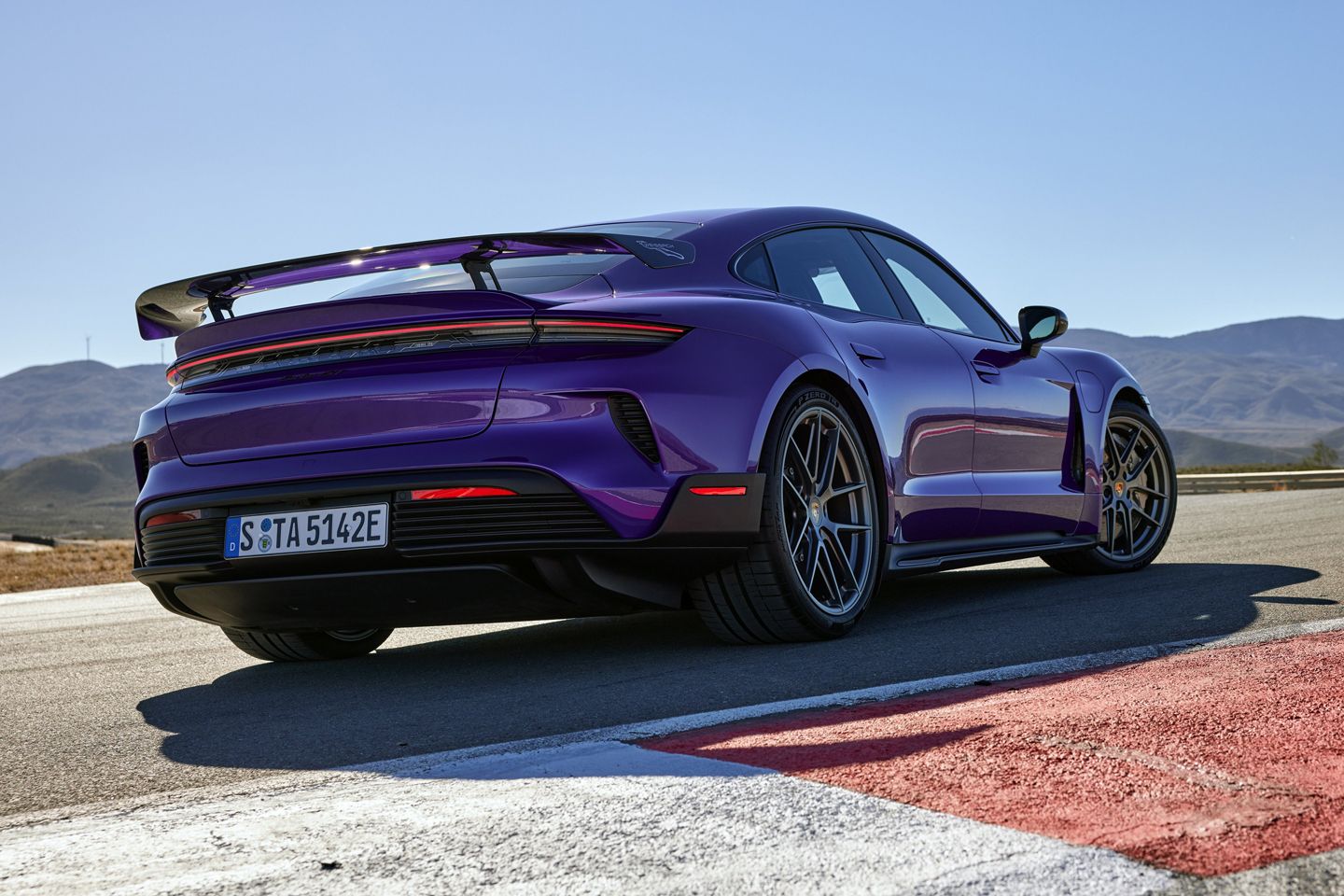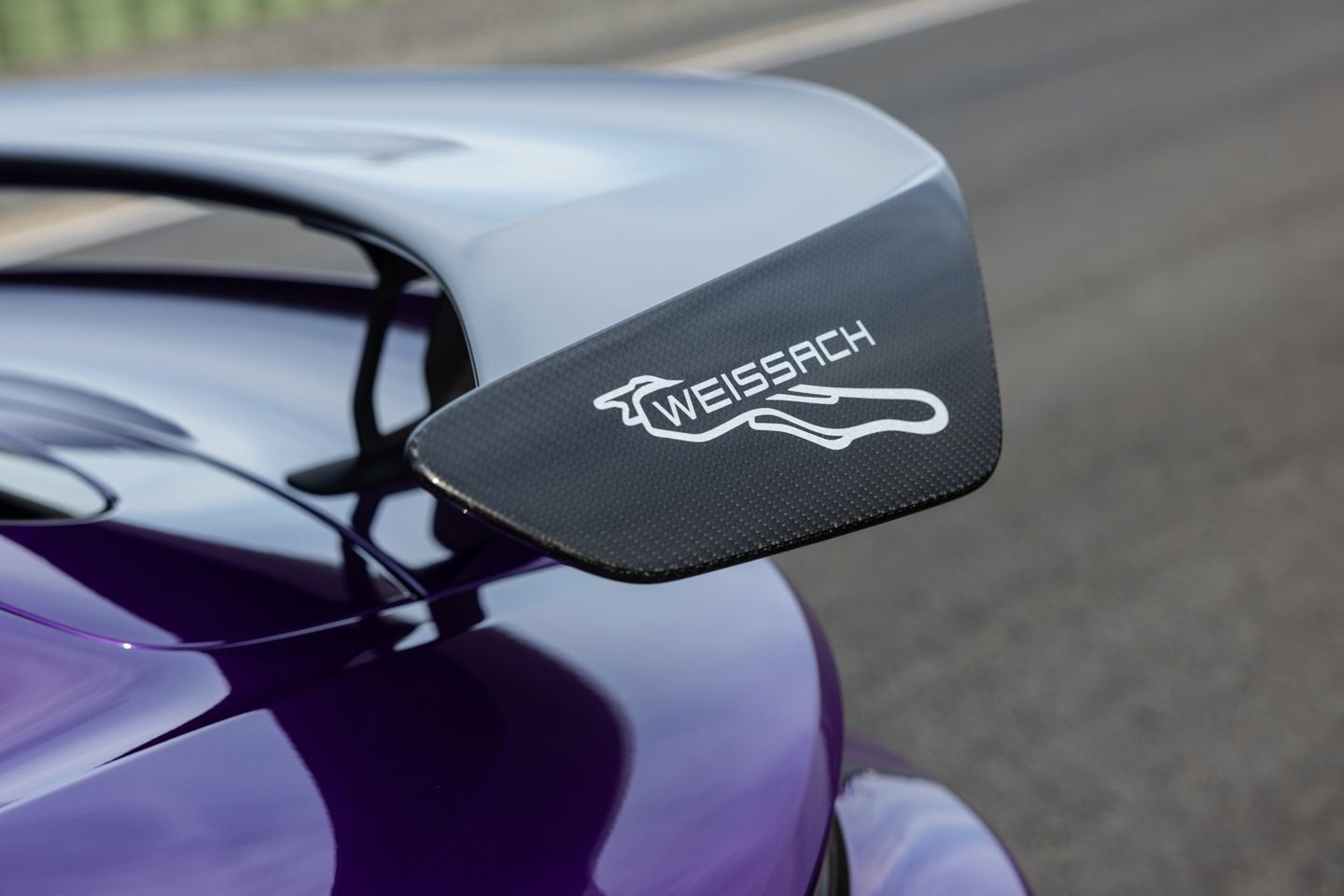2024 Porsche Taycan Turbo GT | PH Review
[ad_1]

When asked if the Porsche 917-30 he was driving in the Can-Am Championship had enough power, legendary racer Mark Donohue replied that it could not have until it was capable of spinning its driven wheels from the apex of one corner to the braking point of the next. Given that the ‘Turbo Panzer’ was ultimately producing around 1,500hp in qualifying trim – and weighed 800kg fuelled – Donohue probably got closer to experiencing his definition of too much than any other driver of his era.
Nearly fifty years later we live in a world of advanced stability control and grippy tyre compounds that have made power outputs that would have seemed impossible in the ’70s almost commonplace. Now some road cars are even getting towards the figures of that era’s punchier racers. The Porsche Taycan Turbo GT has twice as many driven wheels as the 917-30 and weighs nearly three times as much, with traction rarely being a drama. But it follows the lead of its racing ancestor with a four-figure power output, the ability to (briefly) deliver up to 1,092 hp making it the most powerful Porsche road car of all time. Given that the 878 hp Taycan Turbo and 938 hp Taycan Turbo S are definitely not lacking in urge, the Turbo GT really might seem ideally qualified for the adjective overpowered.
Yet it’s not. Because the hugeness of the GT’s output, and the ludicrousness of its acceleration, is entirely matched by the chassis’s ability to deal with it. The Turbo GT is one of those uber-Porsches, a manifesto piece of the sort the company creates for emotional as much as rational reasons, to prove it is the best in any segment it competes in.


In the case of the Turbo GT that means the no-cost option of the Weissach Package, something previously reserved for punchier RS sports cars and the 918 Spider. Selecting this removing rear seats and other luxuries and adding a fixed rear wing; saving 70kg in mass and producing up to 220kg of downforce. It might be hard to imagine many buyers wanting to do that, but the Weissach pack is the same spec in which the Turbo GT recently set the production EV lap record of 7:05.55 at the Nurburgring Nordschliefe.
Porsche had more sense than to unleash journos at the ‘Ring, with the first drive of the Turbo GT taking place on the race track at Monteblanco near Seville, on the same day I experienced lesser Taycans on road. I got to drive three cars, in ascending order of seriousness: the regular Turbo GT, a car fitted with the Weissach Package and then finally a Weissach car riding on the optional road legal, but track optimised, Trofeo RS tyres.
The Turbo GT has been given some substantial hardware changes over the regular Taycan Turbo. Externally it gets new front and rear bumpers, with a chunky wing element at the front, plus an active carbon fibre spoiler on the tailgate (the Weissach Pack swapping this for a fixed rear wing). The powertrain uses the same 97 kWh Performance Plus battery as the Taycan Turbo, but the GT’s rear motor gets a new 900 Amp silicon carbide pulse inverter. Which sounds like Star Trek dialogue for those of us without degrees in electrical engineering, but the upshot is greater switching efficiency and the ability to handle more power. Porsche doesn’t split the peaks between both axles, but the system total is quoted as 778hp regular, 941hp for up to 10 seconds with the driver-selectable Attack Mode, 1,019hp in Launch Control – but with the ability to increase that to the full headline 1,092hp for up to two seconds.


Which sounds painful, and is. To no surprise, the Turbo GT is brutally fast. The Turbo S can already deliver face-distorting acceleration but the chance to do a full launch control start in the Turbo GT produced a sensation that’s close to physical assault. I’ve been in less violent collisions. On Porsche’s numbers, the GT gets from 0-60mph in 2.2 seconds, from rest to 100mph in 4.5 seconds and through the quarter mile in 9.5 seconds – with the Weissach Pack taking a tenth out of each of those figures. Last week I pointed out the Taycan Turbo S is as quick as a Bugatti Veyron to 100mph; the Turbo GT Weissach Pack is as fast as a Chiron over the same benchmark. Top speed is limited to 180mph – a significant increase on the Turbo S’s 161mph – with the Weissach Pack increasing that further to 190mph.
Yet raw acceleration is the least impressive thing about the Taycan GT, as tends to be the way with mega-fast EVs. Lacking the sound and fury of an engine, and the punctuation of gearshifts, makes it hard for a combustion-wired brain to put the physical forces into context. Unlocking the fullest output means remembering to select Attack Mode, either through a small button on the steering wheel’s dynamic mode selector or, more easily, by pulling back on the right-hand paddle behind the steering wheel (the opposite one adjusts regen.) This then gives a 10-second countdown on the digital display, more than long enough to get between any two of Monteblanco’s corners.
Realising the potential for ludicrous speeds, Porsche put a slalom on Monteblanco’s main straight. But even with the need to slow down for that, terminal speeds heading into the first corner didn’t seem to be far off those I saw in the Porsche Panamera Turbo E-Hybrid – which got an uninhibited straight – last month.


So speed is a given, but the magic is in the way the Turbo GT grips and finds traction. It gets a full set of dynamic sharpening options as standard – the electro-hydraulic Active Ride system which really impressed on road to counter roll, dive and squat, plus active rear steering, a torque-biasing rear differential and lighter than standard PCCB carbon-ceramic brakes which save 2.2kg in mass over the regular carbon discs. Working together with the ultra-smart dynamic control system the experience is both recognisably Porsche, yet clearly distinct from that of the company’s benchmark combustion cars.
The Turbo GT’s steering is a real highlight, feeling nearly as crisp and direct as GT3 or GT4 and delivering immediate, proportional responses with more weight and feedback than in the regular Taycan. The lowness of the Taycan’s weight and evenness of its front-to-rear distribution helps the car to turn, but the ease with which what is still 2,290kg of mass heads into tight corners is undoubtedly being sharpened by the battery of active systems. Yet the driving experience feels organic, the cleverness effectively hidden. The only other car I can think of that wears so much technology so lightly is the Ferrari 296 GTB.
Equally impressive is the Turbo GT’s ability to deliver its output and still find traction, powering out of corners with all four tyres chuntering as the control algorithm sends the optimal power to each wheel, yet without any sensation of torque corrupting the steering. The handling balance is neutral, even in Sport Plus, intended for speed rather than showboating. Pushed to the limit, the front axle tends to run wide first, but easing the accelerator slightly neutralizes this nicely; behind the massive grip is an impressive level of adjustability.


The only time the Turbo GT really felt its weight on track was when slowing down. The carbon ceramics bit hard and without complaint – and the Taycan can now harvest up to 400kW under regeneration too – but stopping distances were still longer than they would have been in something lighter. Because physics.
Moving to the Weissach Package turns things up to 11. Beyond the lack of rear seats, replaced by a carbon fibre panel, the Weissach hasn’t been stripped to the extent that fully-shorn 911s used to be. I can still remember the sweatiest day of my life, driving a 997 GT3 RS press car across Germany on a summer’s day without air con. The Weissach keeps climate control, but does lose floor mats, the BOSE speaker system, a fair percentage of the regular GT’s sound deadening and even the dashboard’s Sport Chrono clock. It also gets carbon fibre buckets as standard – the regular Turbo GT offers the no-cost choice between these and power-adjustable sports seats.
Even at sighting lap speeds there is more noise with the Weissach Pack, with a fair amount coming through the naked floor, and with the lack of rear seats and the fixed wing visible in the rearview mirror. But once pushing the driving experience felt unsurprisingly similar – the same huge grip and uncanny stability under power and when turning. I’d love to claim that the reduced weight felt immediately obvious at Monteblanco, but without a race driver’s onboard telemetry it honestly didn’t. Only the additional downforce made an appreciable difference on the circuit’s few faster corners.


But it was the chance to drive the third car that delivered the full experience – this combining the Weissach Pack with the optional P-Zero Trofeo RS tyres it set the ‘Ring record on. Inspection of the minimal tread pattern suggested these definitely wouldn’t be first choice for a wet motorway – but on a warm, dry track they were predictably superb, appreciably increasing grip levels and raising confidence massively in high-load lock-to-lock transitions. The Weissach Pack Turbo GT is so unashamedly compromised there seems little reason not to opt for the stickiest tyres and going full ludicrous.
Porsche admits it is likely that only a small percentage of Turbo GT buyers will tick the Weissach Package box, with an even more limited percentage opting for the Trofeo RS tyres. It exists both as justification for the production status of the record-setter, but also as proof of how seriously Porsche takes this stuff. The regular Turbo GT would undoubtedly be the easier car to live with, and not just for those planning to carry more than one passenger at a time.
As in so many other segments, it feels as if Porsche has created another benchmark car.
Specification | Porsche Taycan Turbo GT
Engine: Double electric motors, all-wheel drive
Transmission: Single-speed reduction (front), double-speed (rear)
Power: 1092hp (system peak)
Torque: 988 lb-ft (system peak)
0-60mph: 2.2-sec (Weissach Pack: 2.1-sec)
Top speed: 180mph (limited) (Weissach Pack: 190mph (limited))
Kerbweight: 2290kg (Weissach Pack: 2220kg)
MPG: NA
CO2: 0g/km
Price: £186,300 (Base price)
[ad_2]